THE ORION SENTENCE.
II111se..T THE sentence upon Henderson and Williams, the 4. ,and mate of the steam-ship Orion, is perfectly warranted by e facts ; and yet the context of other eases, if we may use the expression, and the nature of our penal discipline, impart to it an aspect of unjust
severity. . , .
In a critical part of the passage between Liverpool and Glas- gow, the inn ster retires to bed, although the mate- was 'such a man as the sequel displayed. To save a half-hour in the competition. against a rival boat, the mate, with his eyes open and in spite of remonstrances, ran into the danger which -wrecked the ship and sacrificed many lives. The master is sentenced to eighteen months' imprisonment, the mate to seven years' transportation.
It has been remarked, that the mate cannot complain of his sen- tence on the score that his conduct was free from any basely crimi- nal animus, since that conduct was really criminal and homicidal in its recklessness. This would be true if the nature of our penal cliseipline did not in the first place consign him to associate with vile and hardened criminals,—which he certainly is not,—and so inflict upon him, not only severe chastisement, but disgrace of a kind which he does not merit. The argument would also be more pure if the nature of our penal discipline admitted the principle of atonement, either to the injured individuals or to society ; pre- cisely the sort of chastisement which would have the most whole- some moral example in suggesting to reckless mates the precious character of their charge,. and the danger to themselves of ex- posing that charge to needless peril. As it is, the sentence pur- chases for the mate all the sympathy which is sure to attend on the subjection to unjust severity; and so far, a severity merited by the offence is disarmed of its right influence. But there is another element of injustice. Taking the general run of contemporary history both in regard to time and topogra- phy, people observe that the offence of these men is visited with terrible severity, while offences much more deliberate and reckless are committed with impunity. The deodands which juries gave in some of the most noted railway slaughters were disallowed,
leaving for the respensible persons perfect i impunity. The most reckless neglect of life. has been repeatedly exhibited n the burst- ing of defective boilers, in factory or steamer ; kit where was the sentence to match this one ? Now, that section of the public which is to be impressed by the example Will not judge from the one case, but will take all cases together ; the one case only intro- duces an element of perplexity—a spice of uneasy doubt to relieve the general dead sense of impunity which the vast majority of cases proclaims. The sailor's opinion will be, that it is as well perhaps not to throw away passengers within jurisdic- tion of the public prosecutor—an officer known only in Scot- land. On the other hand, that fear must be somewhat coun- terbalanced by the immunity which offenders enjoy, in eases not technically amounting to crime recogiligajn,bythe law of prosecu- tion, under the absence of a coroner's nuine i st n. Scotland. On the whole' therefore though both England. and Scotland have their traps for extraordinary offenders in hemicide by recklessness, the meshes of the net are very large ; , and if some few are caught, they may be consoled by the sympathy of their confreres and of a public wholly unprepared for seventy.
For both public and culprit are taken by surprise : which shows hew slight an example the latent 'terror of the law could have had ; it was so very latent, and it is topographically so partial. Whence the final conclusion is, that the law in such matters de- mands to be thoroughly overhauled,; both in Scotland and in Eng- land, in order that it May be unifermi *ear, publicly known, and effective in its control


























 Previous page
Previous page